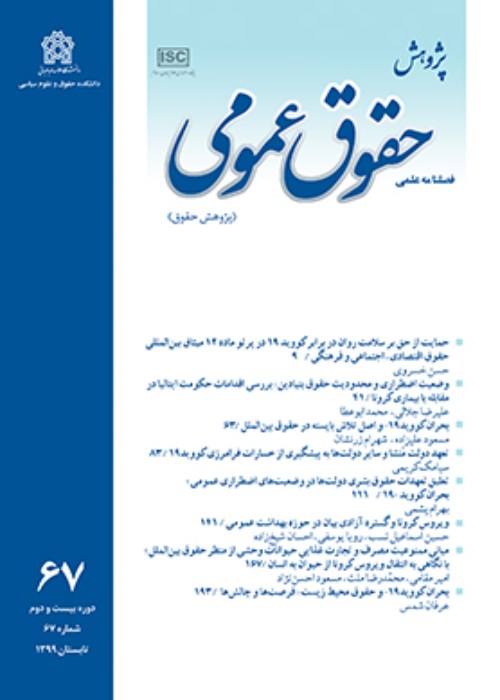A Critical Look at International Law from the Perspective of the Third-World Approaches: Beginning of a Modern Era?
In recent years, there has been a growing trend in the “North and South” dialectics in all fields. International law is no exception to this rule. Recently, in international law studies, in particular, in philosophical discourses and historical development research regarding the origin and the basis of international law obligations, efforts have been made by new scholars to spread the Eastern approach to international law. As these thoughts normally emerge from the less developed and colonial countries, it is called the “Third-World Approach to International Law (TWAIL)”. This approach is rooted in the critical legal studies movement in international law. By taking the Asian perspective into account and also, the evolution of the history of Asian civilizations, this approach attempts to address the inauspicious phenomenon of colonialism in undeveloped or less developed countries, and thereby, decenter Europe as the origin of international law.From 1996 to 2020, we have been facing a significant increase in studies related to this third-world approach to international law, which depicts the possible emergence of a renaissance period in this field of study. Although its initial consistent rise happened between 1998 and 2012, the volume of scientific content production in this approach gradually increased. In fact, this approach points us to a re-examination of the historical evolution of international law. As mentioned, the researchers and experts of this approach are actively present in the world of international law and this approach will undoubtedly impact their opinions and activities.
Furthermore, the third-world approaches to international law have rooted in different areas, but naturally, they have become more prominent in some categories of international law, in terms of studying the methodology and the historical background of international law that were mentioned earlier.The third-world approach functions in two ways: first, it challenges the radicalized power and the hierarchy of international institutions and norms, and second, it examines the past and the present foundations of colonies and imperial structures of international law. Many of the insights created by the critical approach have been important and useful for the supporters of the third-world approach to international law. So, this approach will analyze the current issues of international law and human rights in a critical discourse. Although there is a fear of division and conflict in such approaches, they create more awareness and increase the debate between different nations on the subject which leads to the universality of international law. It is worth mentioning that Marty Koskenniemi and David Kennedy are among the most famous experts in this field of study and have written many articles about this approach.
In conclusion, it seems that the critical and bold approach to international law through the lens of the so-called third-world countries analyzes the deep-rooted inequalities in the international community. The synergy between the critical approach and the third-world approach has expanded the content of international law norms and has created new discourses in international law. Based on the writings of the experts with the third-world approach to international law, it seems that in the past and especially in recent centuries, through the flawed phenomenon of exploitation and colonialism (both in its traditional and modern forms), the powerful countries of the world have seriously damaged the trust of other countries regarding international decisions and regulations concerning third-world countries and especially Asian countries. Thus, actions should be taken to rebuild that trust. It is possible to change the view of third-world countries to powerful countries in international relations. But the emergence of other powerful governments and Asian actors, especially those countries that have a significant impact on the international economy and, as a result, are noticeably influential on politics and international relations, can lead to a redefinition of many concepts in the modern world.Finally, it seems that, regarding the true goals and ideals of international law, the presence of “North and South” views in all areas related to international law have led to different political sides and the current international order. challenges exist at all levels, but the examination and analysis of such multi-dimensional approaches will lead to the expansion of the discourse and exchange of opinions between different nations and will raise awareness and respect for
different cultural systems among them, which finally, contributes to the universality of international law.
- حق عضویت دریافتی صرف حمایت از نشریات عضو و نگهداری، تکمیل و توسعه مگیران میشود.
- پرداخت حق اشتراک و دانلود مقالات اجازه بازنشر آن در سایر رسانههای چاپی و دیجیتال را به کاربر نمیدهد.


